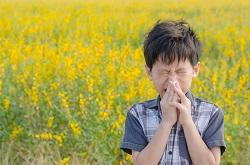Does My Child Have Allergies?
- posted: May 17, 2018
Your five-year-old child is sneezing and coughing. Her eyes are watery and puffy. This can't be another cold, can it? Maybe it's not a viral infection but rather something which plagues millions of children. This could be allergies, and your pediatricians at Southwestern Pediatrics in Maricopa, AZ, can help. Your "kid doctor," Dr. Anthony DiGeorge, and his caring, professional team decipher allergic symptoms and formulate treatment plans that work.
in Maricopa, AZ, can help. Your "kid doctor," Dr. Anthony DiGeorge, and his caring, professional team decipher allergic symptoms and formulate treatment plans that work.
Symptoms
Allergies are the human body's response to certain environmental triggers--things ingested, touched, or inhaled. While these substances are not toxic by nature, the child's immune system over-reacts to them, secreting histamines and other microscopic substances which produce symptoms such as:
- Sneezing
- Coughing
- Wheezing
- Shortness of breath
- Watery, itchy eyes
- Hives (red, itchy, raised skin bumps)
- Tongue and facial puffiness
- Anaphylactic shock
The last symptom may include unconsciousness and severe constriction of the airway. Many children with allergies suffer from anaphylactic shock in response to peanuts or an insect bite or sting. This kind of response is a medical emergency and requires immediate intervention.
Diagnosis
Identification of symptoms plays a big role in allergy diagnosis. Your kid doctor in Maricopa also may perform skin testing which involves introducing a tiny amount of a suspected allergen under the skin and observing the results. Blood tests also help pinpoint allergic responses.
Your pediatrician may suggest eliminating certain foods from your child's diet to see if that impacts symptoms. The American College of Asthma, Allergy, and Immunology also advises a complete medical exam and history to rule out other health problems.
Treatment
Immunotherapy, or introducing known triggers through allergy "shots" or drops, remains a common and well-respected method of de-sensitizing both children and adults to allergens. Use of oral medications, such as antihistamines, treats symptoms as does avoidance of the environments, foods, or substances which precipitate symptoms.
Severe reactions may require administration of adrenaline as soon as possible. Many parents and older children carry EpiPens to give a fast and often life-saving dose of medication on site before proceeding to Southwestern Pediatrics or the hospital emergency room.
Day to day helps
- Wash face and hands after playing outside. Leave shoes in the hall or mudroom to avoid tracking allergens indoors.
- Keep pets, pet bedding, and cages clean.
- Stay indoors as much as possible on high pollen days. Keep windows closed.
- Avoid foods known to cause symptoms.
- Take medications as prescribed.
- Symptoms change over time. Be alert to a reduction in symptoms and to new ones which may arise.
Learn all you can
Dr. DiGeorge and the staff at Southwestern Pediatrics are happy to help children and parents deal with allergies. If you think your child is developing allergic sensitivities, call the office in Maricopa, AZ, for an appointment. Our providers are very knowledgeable, caring, and accurate in their treatment plans. Contact us today: (520) 568-9500.
Our Location
Primary Location
21300 N John Wayne Pkwy Ste 112-113
Maricopa, AZ 85139-8964, United States
Hours of Operation
9:00 am - 5:00 pm
9:00 am - 5:00 pm
9:00 am - 8:00 pm
9:00 am - 5:00 pm
9:00 am - 5:00 pm
9:00 am - 4:00 pm
Closed
